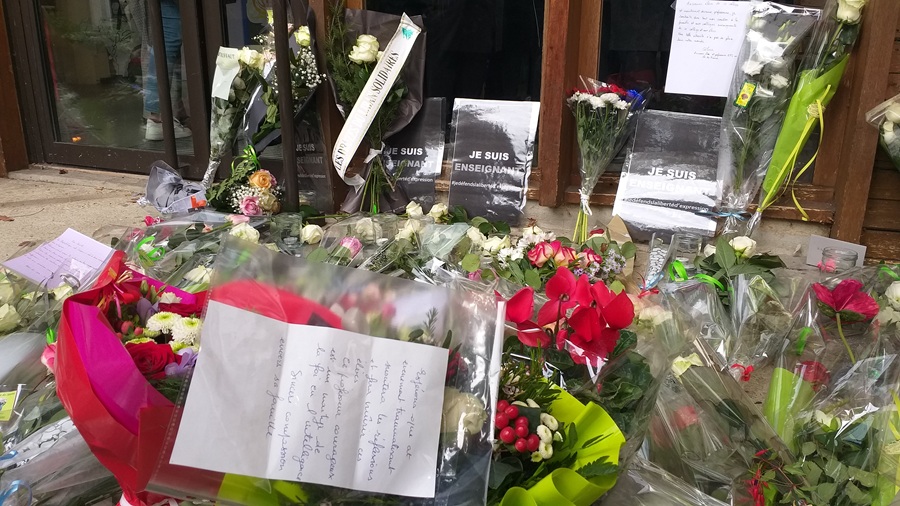- 16 de October de 2025
- No Comment
- 10 minutes read
Eleven days to kill a teacher. In memory of Samuel Paty

Flowers laid in tribute to Samuel Paty outside the school in Conflans-Sainte-Honorine (France). / Wikimedia. Author:

Five years ago, on Friday 16 October, a teacher walked out of his classroom. His name was Samuel Paty. He was forty-seven, and he taught History and Geography at a state secondary school in Conflans-Sainte-Honorine (France). He never made it home. He was murdered outside the school gates, only a few metres from the pupils with whom he had just shared his final lesson. He was killed for having done his duty: teaching.
It had all begun eleven days earlier. As part of the national curriculum on civic and moral education, Samuel prepared a lesson entitled To Be or Not to Be Charlie, using pedagogical materials provided by the French Ministry of Education itself. He invented nothing, sought no controversy; he simply followed the Republic’s own guidelines on freedom of conscience and freedom of expression. With remarkable tact, before briefly displaying the Charlie Hebdo caricatures of the Prophet Muhammad — for a few seconds only — he warned his students that they could look away or leave the room if they felt uncomfortable. No one protested. There was no provocation, no defiance. Only a teacher fulfilling the oldest mandate of the republican school: to teach people to think without fear.
Outside the classroom, however, another story was taking shape. A pupil — who had not even attended the lesson — lied. She claimed that she had been “expelled for being Muslim” and that the teacher had shown “pornographic images of the Prophet”. Her father, a man with a criminal record and a history of radicalism, posted the allegations on Facebook. He published the teacher’s name, the school’s address and phone number, and urged others to “denounce that sick man”. The post was picked up by a professional Islamist agitator, already monitored for radicalisation, who recognised the perfect storm: a supposedly blasphemous teacher, an outraged father, an offended community. Within days, through videos and posts circulating online — with names and addresses attached — a child’s lie had grown into a campaign of hatred.
Meanwhile, the institutional machinery did what it so often does: it protected itself. The school leadership opened a “serious incident” report suggesting that “a teacher” might have breached the principle of secular neutrality. The laïcité adviser sent by the administration, instead of defending Samuel, admonished him with paternal condescension: “If a lesson offends a parent, it should not be taught”. Some colleagues, rather than closing ranks, stepped aside: “Samuel messed up”, they wrote. And the State, fully aware of the agitator’s record, chose to classify the threat as “low risk”. Eleven days were enough for the lie of an absent pupil to become a public fatwa.
Throughout those days, Samuel kept teaching. He slept little and badly. He changed his route to school, walked with his hood pulled up, and asked a colleague to accompany him at the end of the day. He carried a hammer in his backpack — the hammer of fear, but also of courage. He refused to hide. Perhaps he thought that, if he yielded, he would lose something greater than his professional life: he would lose the very principle that makes education possible — that a classroom cannot be governed by threats.
On the day of the attack, at five in the afternoon, his killer was waiting outside. The murderer was eighteen, radicalised as well, and had paid several students to identify “the teacher with the caricatures”. When Samuel stepped through the gate, the young man followed him a few metres, attacked him, decapitated him, and posted the photograph on Twitter with a message addressed to Emmanuel Macron: “I have executed one of your dogs from hell”. A man who taught adolescents that freedom also means listening to those who think differently, turned into a trophy of propaganda.
In the eleven days leading up to his murder, there was a chain of failures — of passivity and fear. The fear of school authorities of faire des vagues. The fear of colleagues of being singled out. The political fear of openly naming radical Islamism without first issuing caveats. A threatened teacher who was not protected, and who died because the State misidentified its enemy.
And that fear has not disappeared. At the school where Samuel worked, five years on, his name still does not appear on the façade; no plaque recalls what happened. When someone proposes renaming the school in his honour, many object — “to avoid tensions”. In some French schools, students now use his name as a threat: “I’ll do a Samuel Paty to you”.
Politicians insist that the era of pas de vagues — the refusal to “make a fuss” — is over. Yet today, in many European countries, teachers prepare their lessons fearing that a photograph, a video, or a misinterpreted remark could destroy their lives. Fear has become a pedagogical principle. And no true education is possible when cowardice disguises itself as prudence.
Tolerance does not mean keeping silent before the intolerant; it means protecting the spaces where we can speak without fear. Samuel Paty was murdered because administrative authorities confused tolerance with surrender — because they believed that coexistence required never giving offence. But when the only way to coexist is through silence, there is no coexistence left, only administered fear.
Samuel Paty’s lesson is not merely a French one. It is European — indeed, civilisational. For a democracy can survive violence more easily than it can survive self-censorship. When fear defines the boundaries of what may be said, freedom ceases to be a right and becomes a privilege reserved for the fearless. The classroom ceases to be a place of thought and becomes a territory of suspicion. The Islamism that killed Paty knew exactly where to strike: not at a politician, not at a policeman, but at the school — that fragile space where we all learn to stop being a tribe and start becoming citizens.
The murder of Samuel Paty cannot be resolved simply by punishing the guilty — there have been trials, verdicts, appeals. It also demands political and moral accountability. We must say, without euphemism, that radical Islamism is not a “religious deviation” but a totalitarian ideology that uses faith as its alibi. Those who spread the pupil’s lie, those who reignited the machinery of hate, knew perfectly well what they were doing. And neutrality does not mean remaining silent before fanaticism; it means defending everyone’s freedom against those who would impose their dogma on all.
Five years on, what hurts most is indifference — the ease with which Europe manufactures amnesia. Every 16 October there are speeches, wreaths, minutes of silence. Yet in too many French classrooms, discussing caricatures remains “a delicate matter”. In too many newsrooms, uttering the phrase “Islamist terrorism” still requires prior justification. In too many offices, the priority remains “avoiding conflict”. Meanwhile, a decapitated teacher stands as the symbol of what we refuse to see: that fear now governs where reason once did.
We must remember him today not to mourn the past, but to warn the present. For what Monsieur Paty defended was not an abstract ideal; it was the principle that sustains everything else. That freedom is not negotiable, nor adaptable to the sensitivities of the fanatic, nor diluted to spare the feelings of the violent. That education means teaching the difference between the right not to be insulted and the duty to endure what unsettles us. Without those limits, the school becomes a fragile refuge for our naturalised cowardice.
Samuel Paty never sought to be a hero. He wanted only to teach his subject well, to help his students understand why a democracy must protect even the ideas we detest. He had no bodyguard, no institutional support, no time. But what he left us is a warning: one cannot teach in fear. Not in France, not in Spain, not in any country that still wishes to call itself free. Five years later, his name should mean precisely that — the line that must never again be crossed.
Because after the word decapitation, there is no “but”. Only a full stop — and a promise: that the lesson will go on.
Source: educational EVIDENCE
Rights: Creative Commons

